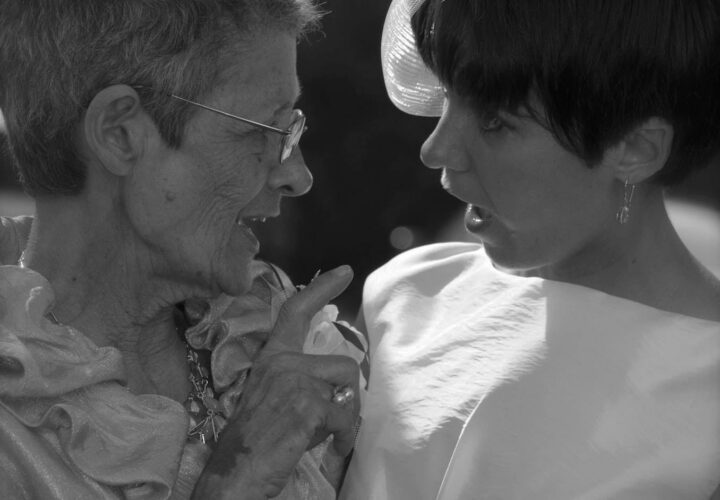Before she was diagnosed with early-onset dementia seven years ago at age 54, Gary Henson’s wife, Brenda, told Henson that if she ever developed dementia, she had one request: She wanted him to move on. Now, 52-year-old Henson and his girlfriend of one year visit Brenda in a nursing home.
Years earlier, when Brenda’s own father was diagnosed with dementia, she watched as her mother struggled with loneliness. “Her mom was reluctant to date because she never officially divorced her husband,” said Henson of his wife’s parents. Brenda told him that she wanted him to date, should they face the same situation.
While Henson still calls Brenda his wife, the couple got divorced shortly after his wife’s diagnosis.
“My wife wanted to see a lawyer to make sure we didn’t have to go through what her parents experienced,” said Henson. And it wasn’t just his loneliness that worried Brenda—money played a role, too. “The lawyer advised us that financially, getting a divorce was the best thing to do,” said Henson.
According to Tim Beanland, head of knowledge management, national services at Alzheimer’s Society in the U.K., the couples’ lawyer may have offered this suggestion because of tax reasons related to an inheritance that could make divorce advantageous. And while divorce may offer a benefit for some, it also makes medical decisions complicated: A divorced spouse will not be considered next of kin to the person with dementia and won’t be able to make decisions with any medical professionals, so divorce is not a blanket solution for everyone, said Beanland. Instead, couples should get separate bank accounts, he said. “At least in the U.K., this makes things simpler for any welfare, or if the person with dementia’s assets are assessed by the state when looking at who will pay for their care.” But when care is self-funded—as is often the case in the U.S.—this does not apply, said Beanland.
Couples often struggle financially after a spouse is diagnosed with early-onset dementia, said Beanland.
“They’ve still got a mortgage or children to care for and they often have to stop working. When dementia takes hold, time’s limited, and you’ve basically got no money to do other things like travel, so it’s quite stressful on a couple,” said Beanland.
Stress is often accompanied by feelings of guilt. Like Brenda, Beanland said that a person with dementia often describes feeling like a burden on their spouse. Feelings of guilt extend to the caregiver spouse, even after their loved one passes away. “The spouse feels relieved because their loved one is not suffering anymore, even if that’s a terrible thing to say,” said Beanland.
The Shock of Onset
For the first year after his diagnosis, Peter Berry, who was diagnosed with early-onset dementia at age 50, considered ending his life.
“I came to the idea that basically, the world would be a better place without me, and my wife and family would get on better without me,” said Berry.

After the initial shock, Berry had another thought that he attributes to saving his life: There are many people in this position with nowhere to turn. Berry decided to help them. Now, he runs the Facebook group Dementia Help and develops videos about his Alzheimer’s experience, including a video he created with his wife that documents his diagnosis through her eyes. Recently, he cycled 350 miles to show it’s still possible to live well with dementia.
As Berry realized, he is not alone. According to the Alzheimer’s Association, 200,000 Americans under age 65 live with early-onset dementia.
However, because an early-onset dementia diagnosis is still rare compared to other forms of dementia, Beanland said that couples may feel socially isolated.
“Often, couples find out who their real friends are because they lose some who don’t know how to react,” said Beanland.
At first, Berry and his wife did not discuss his condition. “We were both embarrassed,” said Berry. “The few friends that have stayed are very, very good, but I must admit that a good 60–70 percent of them have just gone. It’s not that people are nasty or don’t want to be friends. I just think they don’t understand it.”
Henson can relate to Berry’s experience. “I learned a lot about people. At first, everyone kept saying my wife was fine. Then, when they started noticing something was wrong, they stopped coming around,” said Henson.
A Delay in Early-Onset Dementia Diagnosis
Although couples of all ages face Alzheimer’s stigma, Marie Williams believes the lack of resources for young couples, who have a different social profile than older families, may make them feel isolated. Williams’ husband Dominic passed away in 2007 at age 45, from amyotrophic lateral sclerosis (ALS) and frontotemporal dementia (FTD) shortly after being diagnosed.
“The resources are all geared toward older families, so there was no funding and no understanding of what the social impact on teenagers might be, or the impact on their schoolwork. There’s no understanding of the psychological [impact] people are experiencing,” said Williams, who had two teenage boys with Dominic when he was diagnosed.
Beanland said that even the social activities of dementia groups might not be relatable for younger families. “Many singing groups for dementia patients focus on songs from the 30s and 40s, something young couples may not relate to,” he said.
While confused friends and family members may leave couples feeling isolated, even doctors were stumped by Dominic’s symptoms because of his young age, said Williams. Initially, they incorrectly diagnosed Dominic with bipolar disorder.
Marie took her husband to the neurologist when his behavior started to morph. An academic and urban planner who worked in international development, Dominic was a brilliant, gentle and a very engaged father by Marie’s account. Until things started to change: He developed an obsessive desire to take solo international trips, and disinterest in activities he normally enjoyed with Williams and their children. The couple was also experiencing financial issues.
“It just looked like marital trouble, to be honest, or depression or distress. It felt like we were a family in crisis,” said Williams. “In the beginning, when we didn’t know what was going on and we didn’t know if he was sick, that part was devastating because we thought, ‘Gee, this man doesn’t love us anymore. What’s going on?’ That’s kind of awful.”
Ambiguous Loss, Role Reversals and Intimacy
It took doctors four years to diagnosis Dominic. Williams felt confusion and devastation after watching her husband’s personality change. Ambiguous loss, or mourning your loved one while they are still alive, is something many dementia caregivers go through.
“We spent 20 years going on vacations together, and she’s the only other person who shared those memories with me, but now she doesn’t even remember them,” said Henson. “It’s difficult because [your spouse] becomes detached from you and starts talking about you in the third person. She would say, ‘I have to ask Gary about this.’”
Spouses start off as equal partners, but as dementia progresses the partner without dementia transitions from a partner into a supporter, said Beanland. “Psychologically, this experience may be difficult for both partners to adjust to.”
Henson recalls the day he realized how far his wife’s symptoms had progressed. “I walked into our bathroom and noticed she had missed the toilet. At first, I got angry, but then she started crying, and I realized that something was really wrong,” said Henson. “I’ve become more of a caregiver and less of a husband,” Henson said.
A spouse who is caring for someone with dementia may find it difficult having an intimate relationship with their partner, or wonder about consent, said Beanland. “Dementia changes the brain, so the person with dementia may no longer want to be intimate or develops a much stronger sex drive.”
In addition to transitioning from a spouse to a caregiver, each spouse’s daily tasks may change.
Berry ran a timber business for 25 years, but he had to stop working after his diagnosis. “I used to provide all the money, the holidays, and my wife worked in this business,” said the 53 year old. “My wife is no longer involved. She now works three days a week somewhere else, but she ends up doing all of the driving, and it’s a bit of a role reversal.”
An early-onset dementia diagnosis is so unexpected for young couples that they go through what Beanland calls biographical disruption: Couples may have been looking forward to an idealistic future they mapped out together, including retirement and travel plans, but now they have to think about giving up work or a driver’s license, said Beanland.
Maintaining a Strong Relationship in the Face of Early-Onset Dementia
So does an early-onset dementia diagnosis mean that your marriage is doomed? Not necessarily, said Beanland.
“The dementia is overlaying the relationship that is already there, so if you begin in a healthy relationship and then one of you gets dementia, it’s possible the couple will get stronger after.” Yet Beanland was hesitant to oversell this idea. “You would not wish this on anyone.”
Williams agreed that although her love for her husband grew stronger, she does not want to romanticize her story.
“If this illness had come at a time when we had a struggling relationship, I’m not sure that we would’ve survived. We had a very, very strong marriage, and I knew that there was a man under this,” said Williams. “When you get sick, your personal stories can get lost under the illness stories that will profile everything that’s wrong. This illness was not him.”
So Williams found ways to separate the illness from the man she loved. She created a quilt with their children, friends and family members that featured their favorite stories about Dominic. She wanted to build community around her husband and family to avoid isolation, and included Dominic so that he could be the author of his own story.

Berry thinks his diagnosis brought him and his wife closer together.
“My wife and I do a lot of things as a couple now—more than we did before. She goes to all of my appointments, and we do a lot of cooking,” said Berry. “My life is a little richer with Alzheimer’s. Not richer in money or wealth, but richer in the things I do with my wife.”
In addition to cooking, Berry and his wife garden and cycle together. In a 2011 study that explored how spouses construct “couplehood” after a dementia diagnosis, researchers found that many couples keep their relationship going by reframing their experience in light of what they have done in the past.
It’s common for couples to discover new hobbies after a partner is diagnosed with dementia, said Beanland. Couples should remember that life is not over after an early-onset dementia diagnosis.
“We try to balance the reality, which is the person has got a terminal diagnosis, with the reality that some people will live for 10-plus years. So as soon as you get the diagnosis, it’s not as if the shutters come down,” said Beanland. “People keep driving, lots of people keep swimming, or cycling, with a bit more support.”
Nonetheless, early-onset dementia is a life-changing experience for both the patient and their spouse.
“Me and my wife’s life is completely different to what it was four or five years ago, but then, so are many other people’s, and I think that dementia is like any other disease, whether it is depression or cancer. We all travel the same path in this journey, but some of us are just going at different speeds,” said Berry.
Berry adds that as his disease progresses, he wants his wife to remember one thing: “In the future, if I can’t remember who she is, I would just want her to be a friend. Because sometimes, if you can’t remember who people are, just being a friend is as good as anything.”




till death does one take each other in sicknes and health to the end time.
when you see your loved one suffering you love them more, that was and still on my consience as I failed to look after my husband to the end.
I believe that is in most cases impossible, most of us do the best we can! I also, am no longer caring for my husband as I did for 2 years at home while working and can no longer do so!
This is a journey I would not wish on anyone. I am on this journey with my husband who now has moderate dementia and depression. It is expensive and exhausting. Our lives and that of our family are forever changed! I have been left lonely and exhausted by this experience despite making every humanly psssible to provide care, I am a Registered Nurse and even for me this has been an unbearable journey!
Karen,
I wish I could speak with you . I too am an RN. I am 56 and my husband is 59. This is my second marriage and I am not coping well at all. I could really use some advise and have no where to turn.
Well this article and these two comments are very depressing. How can you leave somebody that you pledged your life too because you love them. I work to as a nurse for people with dementia, I also take care of my mother who has it and my wife who is starting to get it. I’m not belittling the difficulty of taking care of somebody with dementia however, I can never picture leaving them or putting in them into a nursing home. I’ve been taking care of my mother who lives with me going on year 4 and although difficult could never picture putting her in a nursing home those places are horrible. When you marry somebody it’s till death do us part I don’t care what’s wrong with them you stand by the ones you love. Reading these comments this article made me very sad for those loved ones. Just because they don’t remember you doesn’t mean they don’t need you.
Thank you for the article. My husband was diagnosed with vascular dementia. Then he suffered a stroke and now needs 24/7 care. He has improved a lot, but nobody is addressing the dementia part. He can snowball,everyone in zero flat and one only find out later that everything had been mixed up in the stories he tells. Not easy. He is on meds, and is stable for the moment.
I REALLY appreciated this article. It voiced many of the issues I found in my marriage after my husband began having many personality changes and problems with his memory. In my case, his personality changes started long before the diagnosis. During these years I was angry, frustrated and just did not understand the many changes that were taking place and the unplanned financial costs that these changes were placing on our tight budget. This was not the man I married!! Until I understood that his brain was changing through no fault of his own, I was fighting mad as his lack of solid thinking, his bad decisions, his dwindling empathy towards me and his seemingly not to care about my, our life, or financial future or much of anything anymore. His lack of thinking and financial mistakes were costing us thousands of dollars we did not have and quite frankly, I was pissed! We had previously been “equal partners” made all of our decision together as a unit and I did not think our marriage was going to make it. Once we got his diagnosis and I began to research and study I began to understand that his brain was broken and these were not actions he was doing on purpose. Although his initial diagnosis was “early cognitive decline” his symptoms were mainly those of Fronto Temperol Lobe Dementia; no short term memory, constant confusion, no empathy towards me, withdrawal from our relationship, lack of interest in intimacy and much more. I was hurt, did not understand and just plain angry. Fortunately once we got his diagnosis my anger and frustration dissolved and I sought out Functional Medicine treatments which worked for him. These were lifestyle and dietary changes that reversed hi cognitive decline.
I want to share a happy ending, and I hope a hopeful story, about the emotional side of this healing protocol….
This disease is so over whelming and all encompassing that many of us tend to focus mainly on the physical side of healing. And yet I have come to realize this…that my husband and I have been on on a parallel healing journey; he for his early cognitive decline and me for my Autoimmune Hashimotos’ adrenal fatigue and thyroid nodules..
Now three years later and after reversing his cognitive decline we now have our marriage and our relationship back. I have discovered, much to my surprise, that we are closer than we have ever been as a couple.
While I have always been committed to him due to our marriage vows of “In sickness or in health” I honestly did not ever think i would see a time where we would regain the love and closeness we had when we were first falling in love….
So please take this side of the disease into consideration if you are considering a more holistic approach to broke-brain issues. I cannot put a dollar value on the emotional side of healing. But for me this emotional reconnecting holds even a greater value than the mental healing side.
Donna
can you share the dietary changes you made and medications that helped?
Gina & Donna, Consult Your Physician – Being Patient does not give medical advice, nor is any information on the site intended to be prescriptive medical advice. If you have any questions about your health or the health of your loved one, please consult your physician for any and all medical-related questions. ~ Thank you.